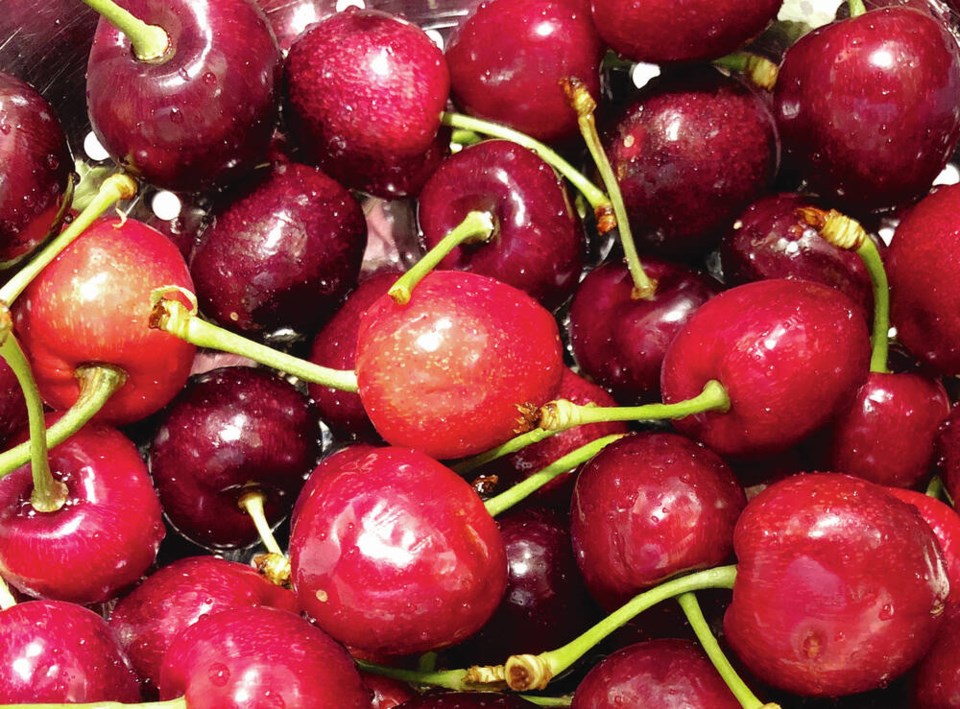Farmers in B.C.’s Interior say rapid fluctuations in winter weather have wiped out many of their peach, grape and cherry crops, meaning consumers will likely see fewer local soft fruits on grocery store shelves this summer.
Emily Chambers, co-owner of Blue Canoe in Creston, said not one of her orchard’s 1½ hectares of lapins cherry trees has produced a single viable flower bud this season.
“We’ll likely have zero cherries,” said Chambers, who has operated the farm with her husband, Trent Mason, for four years now, brokering their cherries to grocers across Canada and the U.S. “We got used to taking out around 40,000 pounds of the fruit each harvest season — but this kind of harvest is unheard of.”
Chambers said she’s fortunate to have provincial crop insurance, which will help cover some costs associated with production loss.
Peter Simonsen, president of the B.C. Fruit Growers Association, said the weather-related damage is the worst the industry has seen since floods caused by extreme weather devastated parts of southwestern B.C. in November 2021.
“What happened was an unseasonal period of warm weather that suddenly got very cold in January. As tree sap was rising it was sort of like having the pipes in your house freeze — it kills the flower buds and can also hurt the tree in the long-term.”
Simonsen, a grower of apples, pears and peaches on a 25-hectare farm he owns in Naramata, said that while some of his apple and pear flower buds managed to survive the extreme weather, he doesn’t expect to see any of his peaches make it to store shelves this summer.
“While most of my peach flower buds were killed, their trees will likely recover before next winter — but bear no fruit this season.”
The farmers are among those who are calling on senior levels of government to provide financial assistance to B.C. fruit-growers in the Interior who have been affected by the extreme weather fluctuations.
“There needs to be emergency funding through the AgriRecovery program so that farmers can get back to producing,” said Simonsen, who noted that many growers are still dealing with damage to their farms from the 2021 floods.
At an unrelated news conference Wednesday, B.C. Premier David Eby acknowledged the recent devastation of extreme weather as a result of climate change’s impacts on fruit tree farms in the province.
“There was no snow to protect the (perennial) plants, the temperature swing was massive and has devastated their crops,” the premier said.
While Eby didn’t announce any plans to provide financial relief to B.C. growers, he said the province “will be supporting those farmers as they rebuild, we understand the importance of the industry and the challenges they face due to the extreme weather we face as a result of climate change.”
Darmer Sukhdeep Brar, vice-president of the B.C. Fruit Growers, said that across the Okanagan farmers are reporting anywhere from 30 to 100 per cent damage to the flower buds of their cherry trees.
“All B.C. soft fruits are going to have some sort of hit. So, apricots, plums, prunes, and nectarines also, but it fluctuates because if your fruit tree is in a cold spot already — such as grapes — the weather is going to do more damage.”
Brar, who grows cherries and peaches on his 47-hectare farm in Summerland, said that damaged flower buds can’t regrow in time for harvest as producing fruit is a multiple-year process.
Due to the devastation to his fruit tree buds, Brar said he decided to hold off on bringing in a dozen foreign workers he employs from Mexico each season to harvest crops.
“If we brought them up here and there was no work that would cost us a lot financially.”
Danny Turner, owner of Creston’s Just A Mere Farm, said he doesn’t expect to be able to harvest enough fruit for a commercial crop this year. Turner reported “100 per cent mortality rate” for buds in his plum, peach and cherry trees at his six-hectare farm.
“With my apples, it’s too early to tell. Just because there is a flower inside doesn’t mean you are going to get fruit because if the pistil (female reproductive organ) is damaged, you’ll get pollination and a fruitlet but the crop will abort in June.
“The reality is that sudden weather changes from hot to cold are common now and policy choices need to reflect the reality of climate change,” Turner said. “I am looking to the Ministry of Agriculture and Food to declare a state of emergency over this and treat it with the urgency it warrants.”
>>> To comment on this article, write a letter to the editor: [email protected]



